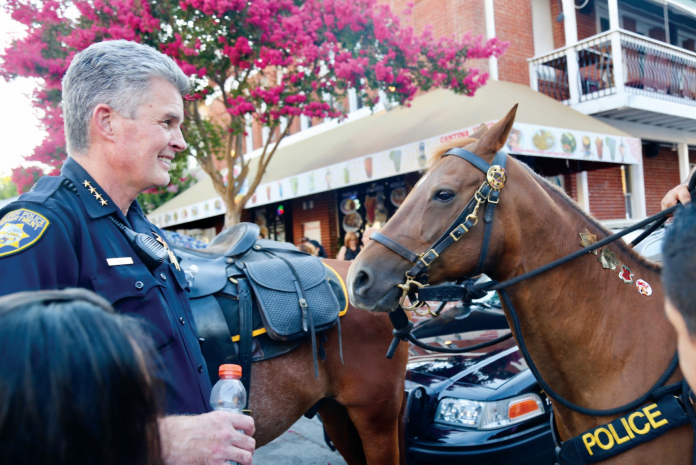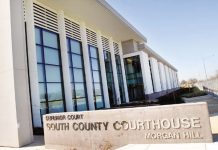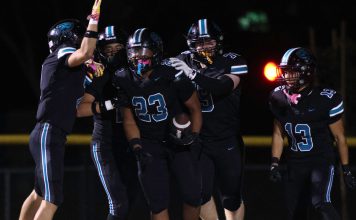
After a nationwide search, the City of Gilroy didn’t need to look far beyond the city’s limits for a police chief. Last Wednesday, during his official swearing in ceremony at New Hope Church Scot Smithee came out of retirement to become the Gilroy Police Department’s newest police chief.
“I decided the day I wake up in the morning and I’m not ready to come back to work, that would be the day that I leave,” Smithee said. “Long story short, that day never came.”
On Monday Chief Smithee, 52, sat down to field questions from the Gilroy Dispatch. He spoke about the changing nature of police work, the role of the press, immigration and the challenge of being a police officer in an increasingly politically polarized world. He spoke of the joys of his work, the difficulties, and dangers, along with the issues that police officers in Gilroy face on a daily basis.
Q: How did you become interested in police work?
A: I got my interest in police work with the Atherton Police Department.I was a police Explorer and Cadet before I turned 18. Coming here as a reserve I’d work weekend nights once a week. I put myself through the police academy in 1985 and was then hired full time. During the week, when I was swinging a hammer in 100-degree heat, I couldn’t wait for the day to be over. I decided, maybe I should try this for awhile. I envisioned myself doing police work for three to five years and then going back to take over the family business building homes.
Q: What separates the GPD from others?
A: It comes down to philosophy, A department is kind of like a big family. You can extend that to the whole community and Gilroy feels like a big family. You must hire people who have a respect for the community and to know why we are here and why we exist. We exist because the people of Gilroy want to have a police department that helps make the town the way people want it to be.
Some people see police work as something you do to people. That’s not what I’m looking for. I’m looking for people who feel police work is something you do for people.
Q: Do you feel the GPD has enough officers?
A: We have several vacant positions available but it comes down to economics, you can never have enough. We need to bring in more people as the town continues to grow and the issues we face continue to become more complex. We recognize that we function off the taxpayer’s dollars and there’s only so many dollars. We’re going to take those resources and do the best job we can do.
Q: Do you compete with other police departments for hires?
A: No. The only time we compete with other police departments is for grants and funding.
Q: Is speeding on Santa Teresa Boulevard a pressing concern?
A: Traffic issues are our number one complaint. We have a unit of officers on motorcycles whose fulltime job is traffic enforcement. Driving habits have gotten way worse. It’s a huge problem everywhere, not just Gilroy. People follow way too closely and drive way too fast. You can get away with that for awhile, but eventually you’re going to crash. I made a traffic stop myself last week. We did get awarded another traffic officer in this year’s budget but I need to get the position hired.
There were more people killed and injured in traffic accidents last year than any other thing combined. There’s a direct correlation between how many tickets you write and injuries in traffic accidents. It’s been shown that the more tickets you write, the fewer injury accidents. Last year we had an increase in injury accidents from 130 in 2015 to 159 in 2016. Fatalities dropped from five to three in that span.
Q: Has crime in Gilroy gone up or down in recent years?
A: Property crimes have gone up by 12 percent and violent crimes have decreased by two percent. When you see double digit increases in property crimes like that, it is significant.
Q: Would the GPD consider a downtown substation?
A: We did that before but we didn’t get much use off it. We have a station with everything you need a couple blocks away. We’ve been given more attention downtown, particularly on Friday and Saturday afternoon and evening.
Q: Has the homeless population been on the rise?
A: That’s a huge problem and very complex. From the last homeless count we did there were 752 homeless people in Gilroy. If you go by population, that’s, by far, the most in Santa Clara County.
Q: Why makes the homeless population so high in Gilroy?
A: I think it’s because we have the availability of services. In the winter there are two shelters in the county, one in Sunnyvale and the other here. We get a lot of people from the county here to use the shelter and a certain percentage of them stay. There are different kinds of homeless people from mental health cases, drug and alcohol cases or people who are just down on their luck. The theft that goes along with that has something to do with the increase in crime, along with Proposition 47 and 57 that voters passed which means we can’t arrest them for that.
If you go look at the all along the waterways and camps around town, that’s where they go to the bathroom and that’s where they throw out their trash; the environmental impact is huge. We do cleanups every month and there are tons of garbage in the waterways. All that stuff is going into Monterey Bay if we don’t do something about it. They need somewhere to go and there’s an idea of building tiny homes, but that isn’t going to completely solve the problem because of the mental health and drug and alcohol cases. Sometimes they don’t want to live in a place with rules. A lot of them want to do what they want, when they want to do it.
Q: What was your best part of being a police officer?
A: Everyone gets into this line of work for similar reasons I think. For me, it was to make things better, to help people. Anytime you get a call when you can save someone’s life, or you can help someone from a traumatic experience and you can walk away with that good feeling inside of you, that’s what makes it worthwhile.
Q: What has changed the most about being a police officer?
A: Technology has completely changed how we do business. If I made a car stop 30 years ago, by the time I was finished getting the drivers license, they might have had enough to know if the car was stolen. Now, before I get out of the car I know, it’s instantaneous. We can collect virtually anything. You can walk out of here and we can swab the table and figure out you were sitting there. It’s wild and it’s nothing like what we learned in the police academy.
Q: Is the advance in technology a good thing or is it bad for police?
A: I think we need to be very careful. After being in law enforcement all these years, my motivation is to catch bad people and hold them accountable. I think there is a very fine line when you have intrusions with cameras. Our Constitution is built on freedom and I think to some extent you’re losing a part of that freedom if you’re being watched at all times. No matter how much you refine technology, there will be someone out there looking exploit it.
Q: In general, do you think the press has been fair to law enforcement?
A: No, I think over the past few years, police work has been beaten up. Sometimes we see things that don’t get reported in the media. The Antifa riot up in Berkeley was very skewed by the media. They had sticks and Molotov cocktails with their faces covered up. The media made it out that the people inside were the ones instigating the incident. That really bothered me and it was opposite of what really happened.
Q: Why do you think that happens?
A: I think sometimes it’s a political agenda.I hate politics because instead of doing what’s right, they do what furthers the political agenda and I think in their minds the ends justify the means. I don’t like that. I don’t care if you’re a Democrat or Republican or what religion you are. What I care about is good people and bad people and I like to hold bad people accountable.
Q: It was mentioned during your swearing in ceremony that the city was looking for someone who embraced diversity. How does the GPD connect with the community?
A: We go out and uphold the law and we do that in one of the most diverse places in the world. I think if you believe in what the country is built on, you don’t need to believe in the same things, but we all have to interact in a mutually respectful kind of way. I think sometimes we get too sucked into our own points of view when we communicate with people. I’ve found in this job and traveling around the world, that generally, people are good, no matter where you go. Sometimes when you communicate with people, you need to understand where they’re coming from and why they think that way. If I find out a person has a problem with the police department I want to find out why they feel that way.
Q: How else are you communicating with the community?
A: The latest has been the immigration issue and we have a lot of groups in town concerned. There’s a lot of fear because of a lot of rhetoric they hear from the media on the national level. People see an ICE officer and they fear being rounded up. That’s just not the case and we want to hear all of those concerns so we can help as much as we can. We also don’t want to sell people on what they want to hear. We need to be honest with people. We tell them what we do, how we do it and what we don’t do.
Q: Will the GPD cooperate with ICE?
A: The answer is yes and no. The misconception is that we assist ICE in rounding people up. We don’t. If we stop you or we have an interaction with you, we don’t even ask if you’re a U.S. citizen. Our job at the local level is to make people comfortable and reduce crime. If we have a segment of our community that is afraid of us because they think we might do something to them, they won’t report crime and work with us and it hurts our effectiveness as a police department. We don’t want to create that atmosphere of fear.
At the same time, we can’t control ICE. It’s a federal agency and they can go wherever they want, including Gilroy and I can’t stop them. If someone asks me if we cooperate with ICE, in the matter of immigration status, the answer is no. If, however, we have someone who is a criminal, that is victimizing people in the community and they also happen to be here illegally, then I’m willing to cooperate with whoever I need to cooperate with to deal with that person. They’ll be held accountable to our local system and then as necessary with ICE so we can get them out of town and stop them from hurting people. Then we need to talk about what kind of crimes. There are low level, silly crimes, that don’t warrant that, but then there are other serious crimes that do that we’ll do whatever we need to do to deal with that person.
Q Would burglary count?
A: Yes, that’s a felony. Rape, murder, assault with a deadly weapon or even a gang member doing crimes to benefit the gang, we have no qualms using whatever we have at our disposal. We are not going after a mom or dad who has been raising their family here for 20 years.
Q: Recently President Trump during a speech in Long Island encouraged police to be “rough” on criminals. Do you think that kind of rhetoric helps?
A: No, I don’t think it helps. We deal with a segment of the population that other people don’t want to believe exists. Sometimes, those people don’t want to cooperate and they resist no matter what. Sometimes we need to use force. I think the law is written appropriately and you only use the amount of force necessary to overcome resistance. Once the resistance is overcome, that’s it. To comment like he did, like ‘Don’t be too nice,’ doesn’t help anything. You don’t want to encourage a physical or violent response, because even though the vast majority of police officers around this country act completely appropriately, there’s always someone out there who’s going to see that as a rubber stamp to do whatever you want. The way things are going, one person can do that and we’re all going to take the hit for it.
Q: Do you feel there is a militarization in police departments and are military grade weapons and vehicles appropriate?
A: I personally don’t see that as a concern. When you have shots being fired and we can’t go out there without being shot, what are the alternatives? If you use something like an armored vehicle, you drive that in front of people and pull them out in safety. A lot has to do with how people perceive us using it. I don’t know what people think we’re going to do with it, but it’s designed to keep people safe, including our own people.
Q: Has the kind of police recruit changed over the years?
A I think you see the generationional kind of changes but I don’t think that’s unique to law enforcement. I think we see more people who don’t have a lot of life experience. That can be a culture shock for someone who hasn’t done this kind of work. They need to understand that not everything works according to the world they grew up in.
Q: Nationwide, the instances of opioid addiction have been on the rise. Is heroin the drug of choice among the homeless?
A: There is definitely heroin use there, but I’m not sure if it’s number one. Methamphetamine, in my opinion, seems to be the number one drug here in town lately. 30 years ago PCP and heroin used to be the big things as well as cocaine.













